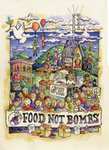There is an unbelievable amount of misunderstanding about the Palestinian people in the West, particularly in the United States, where Palestinians have been reduced to a stereotype in the minds of many, an ugly, deadly stereotype of sub-human, fanatic mad-bombers who deserve what they get from Israel and its allies.
But nothing could be farther from the truth, and this giant demonization of an entire people reeks of the same kind of hatred and vindictiveness that the Nazis perpetrated against the Jews in Europe, in a word, anti-Semitism. And where there is hatred, violence is not far behind.
But how can you call this anti-Semitism if is employed against Arabs? They are not Jewish.
Quite easily, because ethnically, the Arabs are also considered a Semitic people, just like the Jews. They all came out of the same cutural cauldron of southwestern Asia. The term Semite refers to any member of the various ancient and modern peoples originating in that area, including the Akkadians, Canaanites, Phoenicians, Hebrews, and Arabs. Of course, even the term Arab, when applied to the Palestinians, is a cliche when applied to all of them, because there were Persian, Greek, Norman and Frank, Turkish and later British cultural influences, not to mention intermarriage. The bottom line is that they are humans made in the image of God (and Goddess).
So it is ironic that even some Jews fall into the trap today of demonizing the Palestinians, their Semitic brothers and sisters. But this is what power politics, propaganda and violence do. They turn brother against brother.
But here is a brief video to challenge this god-forsaken stereotype, one that shows us the historical cultural, even physical beauty of the Palestinian people, a culture that the world should both be proud of and want to see flourish again.
Thursday, November 22, 2007
The Culture of Palestine
Labels:
anti-Semitism,
Culture,
hatred,
Humanity,
Tolerance,
Understanding
Subscribe to:
Post Comments (Atom)












2 comments:
I fully match with whatever thing you've presented.
It will not succeed as a matter of fact, that is what I consider.
Post a Comment